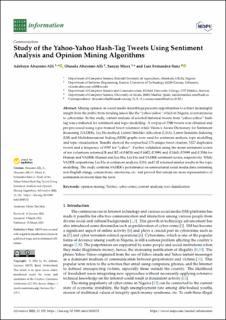| dc.contributor.author | Abayomi-Alli, Adebayo | |
| dc.contributor.author | Abayomi-Alli, Olusola | |
| dc.contributor.author | Misra, Sanjay | |
| dc.contributor.author | Fernandez-Sanz, Luis | |
| dc.date.accessioned | 2022-11-17T12:57:01Z | |
| dc.date.available | 2022-11-17T12:57:01Z | |
| dc.date.created | 2022-03-24T11:47:59Z | |
| dc.date.issued | 2022 | |
| dc.identifier.citation | Information. 2022, 13 (3), Artikkel 152. | en_US |
| dc.identifier.issn | 2078-2489 | |
| dc.identifier.uri | https://hdl.handle.net/11250/3032460 | |
| dc.description.abstract | Mining opinion on social media microblogs presents opportunities to extract meaningful insight from the public from trending issues like the “yahoo-yahoo” which in Nigeria, is synonymous to cybercrime. In this study, content analysis of selected historical tweets from “yahoo-yahoo” hash-tag was conducted for sentiment and topic modelling. A corpus of 5500 tweets was obtained and pre-processed using a pre-trained tweet tokenizer while Valence Aware Dictionary for Sentiment Reasoning (VADER), Liu Hu method, Latent Dirichlet Allocation (LDA), Latent Semantic Indexing (LSI) and Multidimensional Scaling (MDS) graphs were used for sentiment analysis, topic modelling and topic visualization. Results showed the corpus had 173 unique tweet clusters, 5327 duplicates tweets and a frequency of 9555 for “yahoo”. Further validation using the mean sentiment scores of ten volunteers returned R and R2 of 0.8038 and 0.6402; 0.5994 and 0.3463; 0.5999 and 0.3586 for Human and VADER; Human and Liu Hu; Liu Hu and VADER sentiment scores, respectively. While VADER outperforms Liu Hu in sentiment analysis, LDA and LSI returned similar results in the topic modelling. The study confirms VADER’s performance on unstructured social media data containing non-English slangs, conjunctions, emoticons, etc. and proved that emojis are more representative of sentiments in tweets than the texts. | en_US |
| dc.language.iso | eng | en_US |
| dc.publisher | MDPI | en_US |
| dc.rights | Navngivelse 4.0 Internasjonal | * |
| dc.rights.uri | http://creativecommons.org/licenses/by/4.0/deed.no | * |
| dc.subject | opinion mining | en_US |
| dc.subject | Twitter | en_US |
| dc.subject | cyber-crime | en_US |
| dc.subject | content analysis | en_US |
| dc.subject | text classification | en_US |
| dc.title | Study of the Yahoo-Yahoo Hash-Tag Tweets Using Sentiment Analysis and Opinion Mining Algorithms | en_US |
| dc.type | Peer reviewed | en_US |
| dc.type | Journal article | en_US |
| dc.description.version | publishedVersion | en_US |
| dc.rights.holder | © 2022 by the authors. | en_US |
| dc.subject.nsi | VDP::Teknologi: 500::Informasjons- og kommunikasjonsteknologi: 550 | en_US |
| dc.source.volume | 13 | en_US |
| dc.source.journal | Information | en_US |
| dc.source.issue | 3 | en_US |
| dc.identifier.doi | 10.3390/info13030152 | |
| dc.identifier.cristin | 2012241 | |
| dc.source.articlenumber | 152 | en_US |
| cristin.ispublished | true | |
| cristin.fulltext | original | |
| cristin.qualitycode | 1 | |

